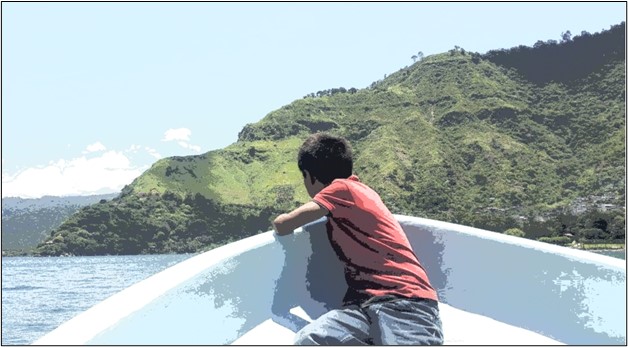Blog by Dipal Savla and Kanani Titchen
“Erick” presented to the adolescent medicine clinic in San Diego, California for his routine wellness appointment. He was a new patient, so the doctor focused the appointment on getting to know him.
Erick lived with a foster family. His mother, lacking access to necessary medical care, had recently died. Erick aspired to be a nurse and help patients like his mother, but he worried that nursing school was not an option for him. His doctor asked him why.
Erick shared that he was sentenced to juvenile jail for transporting drugs a few years earlier. Desperate to help with his ill mother’s medications, he had connected with a stranger online who offered financial assistance in exchange for delivering a package. Unbeknownst to Erick, he would be tasked with couriering an illicit drug across the United States-Mexico international border. At the border, he was detained, arrested, and sentenced to juvenile jail.
Erick’s doctor recognized that his criminal record could make acceptance to nursing school unlikely, perhaps impossible. Suspecting that he may have been coerced to perform an illicit activity, which can constitute labor trafficking, she referred him to a local legal center that advocates for survivors of human trafficking. Through such centers, survivors can access supportive services and are sometimes able to expunge their criminal records of convictions related to their exploitation, secure protection from their traffickers, and achieve financial independence. In some cases, vacatur may be granted, which goes one step further than expungement and reverses the finding of guilt, thereby acknowledging the survivor’s status as a victim rather than a criminal.1
Erick lived in California, the state with the highest reported rate of human trafficking in the United States. However, human trafficking occurs in every state in the United States, and internationally as well. Historical trends showed that spikes in the number of cases of human trafficking pinpoint major economic recessions and natural disasters with striking exactitude, and early data from the FBI human trafficking specialists show these trends reemerging during the COVID-19 pandemic.
As our society confronts this pandemic, we must prioritize protecting the rights of those most vulnerable to exploitation. As I think about my responsibility as a doctor, I reflect on the instances where Erick’s journey intersected with the healthcare system. Three salient lessons emerge:
- Nothing is more powerful than taking a thorough, non-judgmental history and building good rapport with the patient. Even when time feels scarce, it is important that we be fully present with our patients. We should inquire directly about work, relationships, substance use, and safety, and ask follow-up questions when something seems off. We may not cover everything during the first visit, but if we establish good rapport, we can arrange a follow-up appointment to continue the conversation.
- We must be aware of the local resources and services available for our patients. As doctors, it is not our job to prove our patient has been trafficked. However, if we suspect human trafficking, we should assess our patients’ needs, connect them with resources, and consider seeking assistance from the National Human Trafficking Hotline.2 If the patient consents, we should consider involving legal assistance and law enforcement. Sometimes, it may be necessary to involve Child Protective Services – with full disclosure to the patient and with explanation that we, the doctors, need to bring in some back-up to help us.3 We should never use language that involves “reporting” the patient, since they may assume blame and fear repercussions. Most states offer survivors of human trafficking some degree of criminal record relief. There are other resources available that provide vocational assistance, educational scholarships, temporary housing, and legal advocacy.
- We must educate ourselves and our colleagues about human trafficking. We can start with the online training program developed by the U.S. Department of Health and Human Services to identify and respond to trafficking: https://www.acf.hhs.gov/otip/training/soar-to-health-and-wellness-training.4
Erick continues to follow up with his physicians and has disclosed concerns and discomfort with other aspects of his physical health and lifestyle that indicate that he trusts his doctors and sees the clinic as a safe space. I hope that his lifelong relationship with healthcare providers will continue to be generative and foster Erick’s growth into a well-adjusted, productive, healthy, and happy adult free from a life of bondage.

Works Cited
[1] Owens M. Human trafficking victims’ need for vacatur: demolishing roadblocks to freedom: an analysis of the current state laws in the united states, the current federal landscape, and a call for the united nations to amend an existing protocol to allow victims of human trafficking to vacate their criminal records. American University Journal of Gender, Social Policy & the Law. 2020;28(2).
[2] National human trafficking hotline. Office of Trafficking in Persons website. October 22, 2019.
[3] Responding to child victims of human trafficking. Child Welfare Information Gateway website. 2019.
[4] SOAR to health and wellness training. Office of Trafficking in Persons website. September 24, 2019.
Dipal Savla, MD, is a pediatrician in the San Francisco Bay Area, and an advocate for global and immigrant health. She received her medical degree from Icahn School of Medicine with a distinction in research for her work in global health, trained in pediatrics at UC San Diego and Rady Children’s Hospital.
Kanani Titchen, MD, FAAP, is an Adolescent Medicine physician at Rady Children’s Hospital and an assistant professor at UC San Diego, as well as co-chair of the health subcommittee for the San Diego Human Trafficking and CSEC Advisory Council. She has delivered a TEDx talk on human trafficking, authored numerous articles for medical journals and the lay press, and is a trainer for the SOAR to Health and Wellness human trafficking module with the U.S. Department of Health and Human Services.